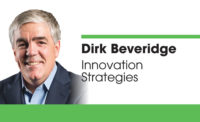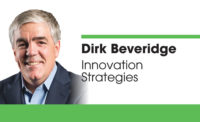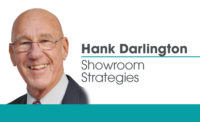UnleashWD Innovation Summit 2019 has wrapped up and once again, I’m bouncing off the walls with the energy created by all the smart, engaged, creative people I met. I am so grateful for the caliber of people that populate this conference. I am awed by the drive they feel to go home and make impactful changes that will guide their companies’ processes, culture and leaders forward. These are the people that are writing the future for distribution and they’re doing it right now.
If you missed the summit — good news! — you can join us next year November 5–6 in Chicago. But for now, here’s a recap of axis-spinning ideas to get your synapses firing to create better sustainability and profitability for your company into the future.
1. Find your “essence:” To your own self, be true
Lara Lee, founder & CEO of Creative Renewal, wants you to blur out all the fantastic noise of technology and focus on something else: Their essence. Dig down deep and figure out what makes you as an individual valuable, exciting and important — and do the same for your business. How were you founded and why do you exist, to serve what purpose? What defined your company at the height of its success? Build your value, purpose and process around these core qualities.
Knowing yourself better will also make you a more capable leader. Leadership professor William Sparks had the audience test themselves to define their leadership profile, which includes a lot of lovely, shiny qualities — but each has a dark side that comes out under stress. (Test yourself here!) Understanding, embracing and mitigating that dark side can have a profound impact on how we lead through difficulties.
2. The world is changing, so never stop learning
The global economy is shifting. Computing power is growing. The Internet of Things will inevitably change the world in ways it’s hard to imagine, and soon. We will no longer need things like personal cars, stores or hospitals. Even the idea of what a company is will no longer exist. How do you avoid being victimized by all that? John McDonald, president, chairman & CEO of ClearObject, told us: "Don’t fear it; go learn through iterative failure; and be a doer, not a dreamer."
3. Our businesses need us to be vulnerable and creative
Nearly every job description these days dictates creativity as an essential skill, yet most workers don’t think of themselves as “creatives,” the noun version. Speaker and guitarist Ed Eason, who tours the world playing with Carrie Underwood, made the case for businessmen and women as essential creatives. Their work involves the imagination or original ideas, which is by definition, “a creative.” And like creatives in a band, you must select your members carefully to ensure they share your creative vision. He quoted Brene Brown: “Vulnerability is the birthplace of innovation, creativity and change.” How can you foster an environment where vulnerability is not only okay, but encouraged?
Valin Corp. did it. The company embraced its young leaders and gave them opportunities to say, “The way we’re doing things is not working. We need a better way.” Valin’s Regional Sales Manager Devon Hyatt told the audience that he hated his company’s CRM and its arbitrary demands on his team, so he told management it wasn’t effective — and used his own data to back up how his process was better. That moment of vulnerability was part of what prompted a digital transformation that positioned the midsize distributor among billion-dollar brands.
4. Don’t overthink it and seek “brilliance in the basics”
This year we featured two military speakers whose presentations on leadership and teamwork drew plenty of parallels, but the most underlined was to get back to basics. Retired Sergeant Keni Thomas, who led his troops through the 1993 Battle of Mogadishu, flatly told the audience that “You’re overthinking it,” he said. “You’re a little bit more capable than you give yourselves credit for.” What your business and all its employees need is a strong foundation of fundamentals.
Retired officer and founder of Impact USA Joe McNamera called this “brilliance in the basics.” By getting the most basic functions of your job and the most basic tenets of your company’s value proposition brilliantly right, you have what you need to build, innovate and pivot with agility. “There is no such thing as rising to the occasion,” he said. “We fall back on the habits we create in training.”
5. Platforms: Embrace with caution
Platforms are the most dominant business model in the world right now. But how can distributors take advantage? It breaks down essentially into this proposition: Build or join.
So should you join Amazon Business? Our speakers were conflicted. Nicholas Johnson, co-author of “Modern Monopolies,” said he sees companies try it out under a new business name, but you also need to be careful to protect your catalog and data — your most valuable assets, said Vincent Payen, co-founder and president of HomeX.
6. If culture isn’t part of your innovation conversation, start talking
When you think about business innovation, most people think about technological changes. Digital transformations. But strategic changes in leadership and culture can be transformative in their own right, and minimally must hold hands with technological advancements and process changes.
Beth Ladd, VP of innovation at the American Supply Association, taught us that people want three very basic things: To be known, to know that they’re relevant and to know how they will be measured. In short, people want purpose. They want to know that what they are doing matters — and will continue to matter throughout and after a major change. Are you providing strategic thinking that meets those needs?
Wendy Whiteash, EVP for culture at U.S. LBM Holdings asked some truly tactical questions: Who has executive oversight for culture? How do you measure it? Do you employ engagement surveys or benchmark retention statistics? You should.
So let me ask you this…
I will leave you with the theme running through our conference: I Lived.
- When is the last time you did something for the first time?
- What do you want to be celebrating a year from now (you can celebrate it with us at the conference)?
- Finally, what can you do today that will make you feel like you truly lived?
Think about it and let me know.





